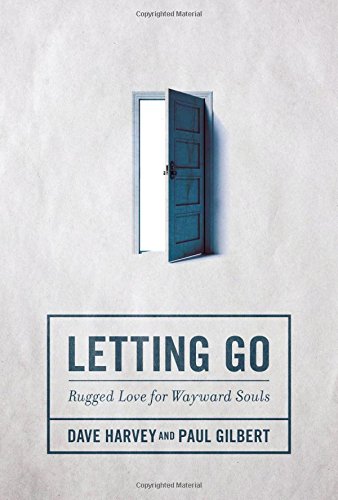Few things could be more painful than a wayward loved one, and it’s not always clear how to move forward. What should we say? How can we best relate to them and help?
Hi, I’m Fred Zaspel, editor here at Books At a Glance, and we’re talking today to Paul Gilbert, co-author of Letting Go: Rugged Love for Wayward Souls, a book designed to provide guidance with just these kinds of situations.
Paul, welcome! And thanks for talking to us today.
Paul Gilbert:
Thanks so much for having me, Fred; glad to be here.
Zaspel:
Who are the “wayward” you’re talking about in this book, and who did you write this book for?
Gilbert:
The “wayward” would be a broad category to identify folks who are walking away or have walked away from the roles, the relationships that God has called them to; whether it be a parent or husband, father, child, or church member. So “wayward” is a broad category that extends beyond what we typically think about in terms of prodigal children; but those who have lost their way. I think the book was written not primarily. . .well, it was written for them but it was directed to those of us–whether we are parents, family members, church members, pastors, leaders–those of us who are walking along side of the wayward. Those of us who are trying to help those who are walking alongside of the wayward. So it’s for folks who find themselves on the other end of the equation.
Zaspel:
Your experience with these situations comes in a pastoral context, right? And maybe you could introduce both yourself and your co-author.
Gilbert:
I am the lead pastor here at Four Oaks Community Church in Tallahassee, Florida. I’ve been here about 20 years and Dave Harvey, who has been on our team for about 3½ years, has extensive experience in terms of leading us in the denomination and pastoring a local church as well. A lot of this material and ideas were born out of pastoral ministry, counseling situations, church discipline situations, and common features that we saw in all of them.
Zaspel:
Explain your title for us – both the “Letting Go” and the “Rugged Love.”
Gilbert:
I think in pinpointing the central defining concept of the book I would say “rugged love.” What we’re doing here, Fred, is not pioneering a new, innovative way of loving. In fact, we would say that rugged love is just biblical love. But rugged love is fully orbed biblical love. When we think of love, either where we’re thinking sentimentally or we’re thinking romantically (and those are all aspects of love), we would say that fully biblical orbed love has teeth. So, when we think about what it means to love a wayward person, the ‘letting go” aspect features a prominent category that we see in Scripture, which is oftentimes absent in the way that people try to navigate these situations.
So, letting go denotes this idea that God disciplines his people. He loves his people. And one of the ways he does that is that he allows them to experience the consequences and the fruit of their actions. He doesn’t do this to hurt them. He doesn’t do this because he doesn’t love them. In fact, it’s because he loves us that he disciplines us. So, letting go denotes the idea of what it means to walk alongside someone, to love someone, in a way that allows them to experience the fruit of their actions, the consequences of their choices. That’s not all it is, but that’s certainly a major component of it.
Zaspel:
Okay, there’s hardly a one-size-fits-all answer, but speaking just broadly, what are some good and some not so good ways we might relate to wayward loved ones.
Gilbert:
I think one of the things that we have been struck with is that how common the responses are across a variety of situations, but which seem to be unhealthy. Ways that people can respond that are not healthy would be bargaining, seeking a compromise with someone who is straying, begging them to change their ways. Putting oneself down in the lower position, so to speak, which oftentimes serves to only empower and enable the wayward person in their prodigal behavior. When we think about healthy ways to respond, and that’s what the book is written about, on the surface it means, first of all, for someone clearly defining what it means to love. And then, being able to see that rugged love actually enforces consequences. Rugged love has limits and boundaries. Yes, rugged love is patient, it’s forgiving, it’s compassionate, but if it’s not encompassed with all aspects of biblical love then what we are doing is, in fact, not loving them. We are doing something short of that. So, the book is designed to address that basic question.
Zaspel:
Talk to us about the problems of enablement on the one hand and forgiveness on the other. When is our love and patience overly tolerant? And talk to us about the when and the what of forgiveness.
Gilbert:
That’s a great question. Jesus says in Luke 17, “if your brother sins, rebuke him. And if he repents, forgive him.” I think there’s an aspect there that what Jesus is saying is that if someone injures me and they never repent or they never turn back or confess their sin, there is a sense, of course, I can still forgive that person in my heart. But Jesus is saying that in a relational context, if someone has injured us or if someone has strayed or betrayed us, unless there is a fundamental recognition of that sin, of that wrongdoing, and then some sort of confession/repentance, then that relationship is going to have limits. Like a husband repeatedly cheating on his wife and coming back to her and saying he’s sorry and finally the wife saying, “I just can’t do this anymore,” and him saying, “well, don’t you forgive me?”
Well, forgiveness biblically denotes this idea of restored relationship. And so, oftentimes, what we mean by forgiveness is: just ignore what I’ve done and don’t bug me about it. Versus confession, repentance, knowing how our sin has impacted someone else. So it’s that kind of forgiveness that Jesus says 70 × 7. Oftentimes we mistake that for: if I simply say I’m sorry, then that’s the Band-Aid that fixes everything. Sorry is important, but it has to be born out of, what Jesus told the Pharisees, “bear fruit in keeping with repentance.”
Zaspel:
You write that “God sometimes pursues us by releasing us.” What does this mean, and how can we mirror this in our own relationships with wayward people?
Gilbert:
There are many places biblically that you can draw from, but we can see, for example, in the Old Testament, God’s love for his covenant people, his kindness towards them. And this kindness was demonstrated by his calls, continually, for them to return to him. Yet, when they would harden their hearts and refuse, we see God in that instance letting them go, releasing them to exile, releasing them to deportation, so that they would learn, so that they would experience what it means to walk outside of God’s protective graces. Even in the parable of the prodigal, there are a lot of things that the father could have done in response to the rebellion of the younger son. Again, we can think about the compromises, the pleading, the bargaining that might happen; but, in fact, the father released him to go into the distant country. And we know what that release meant. It was not a matter of sending him on a vacation. When the son claimed his inheritance and left the home, he was in fact making a strong statement that his father was dead to him. His family history was dead to him. And the father allowed him to walk in the path that he had chosen so that, when he comes to the distant country, experiences life outside of the father’s care, he comes to his senses, he “snaps to,” and he is returning home out of a heart of faithfulness. The father is certainly searching on the road for him, and looking out for him, but he is not journeying into the distant country and dragging him against his will, so to speak. He is allowing him to soak in the consequences of his choices.
Zaspel:
How can the church corporately help in these situations?
Gilbert:
I think that one of the things that is oftentimes experienced by people who have been (and this is a strong term) victimized by the wayward person, whether it’s a spouse, or parent, or church member, or whoever, is to feel a lot of shame, is to feel a lot of guilt, is to hide, is not to want to bring that into the light of the community of believers. So I think one of the things that needs to happen culturally on the part of the church is creating places where it is safe to talk about how we have been devastated. Where it is safe for us to talk about how we feel betrayed by these folks in our life. It is creating a culture that encourages people to bring these things into the light, into community.
We see this even in I Corinthians 5 where the waywardness of this man who is having an inappropriate relationship with a woman in this church. Paul’s solution to this is to be speaking to the body. He is saying, here should be your posture. Here’s the boundaries you need to set. At the same time, in II Corinthians 2, he is telling the church to open your arms wide for this repentant sinner. So I think, as a church, we need to have a culture that encourages forthcomingness; while, at the same time, not holding people to a higher standard than God does in terms of when they are actually seeking genuine repentance.
Zaspel:
We’re talking to Paul Gilbert, author of the new book, Letting Go: Rugged Love for Wayward Souls. It’s an uncommon resource for a sadly common problem. I can tell you pastorally that a resource like this is very needed. You’ll want a copy available in your church library.
Paul, thanks so much for talking to us today.
Gilbert:
Thanks so much.

